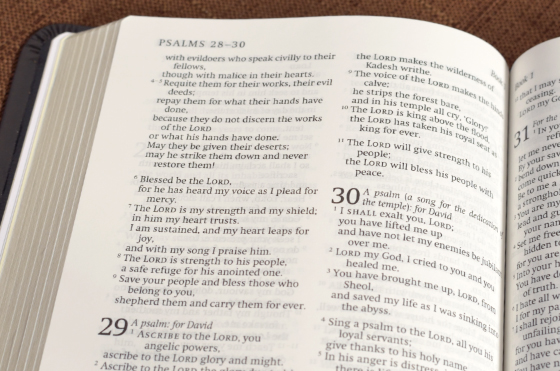Blog
Psalm 28
Friday, April 05, 2019

To You, O Lord, I call;
Do not be deaf to me;
If you are silent, I’ll descend
To depths of misery.
With pleading in my voice,
I cry to you for grace;
Regard the lifting of my hands
Toward Your most holy place.
O do not drag me off
With those who practice sin,
Deceiving all with words of peace
While evil lurks within.
According to their works,
Give them their due reward,
For surely they must be undone
Who do not fear the Lord.
How blessed is the Lord,
For He has heard my voice!
With all my heart, I trust in Him,
And with my song, rejoice.
Our refuge and our strength,
He saves us from all harms;
O Lord, bless Your inheritance,
And bear us in Your arms!
A Note on _Unplanned_
Thursday, April 04, 2019

This past weekend, the movie Unplanned opened. It follows the transformation of a woman named Abby Johnson from abortion-clinic worker to pro-life activist. Suffice it to say that the reaction from the secular left has not been ecstatic. It received an R rating from the MPAA for its graphic depictions of abortions. Strange. I didn’t know a depiction of a medical procedure could be graphic.
Theater owners have refused to run it. Reviewers have generally ignored it, and those who have seen it have evaluated it on progressive-morality (“Worst. Movie. Ever.”) rather than artistic grounds. Even the movie’s Twitter feed went down on opening night, for reasons that have yet to be adequately explained.
If you will pardon the pun, we’ve seen this movie before. Back in the day, the sensational Gosnell trial was roundly ignored by the mainstream media. So too was the film produced about it. Pro-life Supreme-Court nominee Brett Kavanaugh was treated to the most impressive smear campaign in recent memory, with uncorroborated accusations treated as gospel and fabrications advanced as plausible.
Just ‘cause you’re paranoid doesn’t mean they aren’t out to get you.
With a little thought, the reason for this one-sided narrative becomes obvious. It’s not about the truth of the matter. In their heart of hearts, everybody knows that abortion is about killing babies, whether or not they will admit it. Instead, it is about the progressive idol of sexual autonomy, the idea that everybody should get to have all the unrestricted sex they want without consequences.
However, sex as designed by God is a consequential act. Its most significant consequence is the creation of new life. Once you have to reckon with those consequences, the idol of sexual autonomy is revealed to have feet of clay. The only way for progressives to resolve the problem is to make it possible for the consequences to. . . go away.
See? No harm done! Continue fornicating!
Unfortunately for them, the pro-choice case started out weak and is getting weaker. Viability used to be the buzzword for distinguishing between a baby and a clump of cells. However, as medical technology continues to advance, babies born as early as 21 weeks now have a chance at survival. The day may come when even an embryo can be nurtured outside the womb.
This reveals what always has been true: the pro-choice position is based on magical thinking. What you want something to be—in this case, a fetus—determines what it is. The wanted fetus is a baby to be defended with an arsenal of medical might; the unwanted fetus is a malignant growth to be scraped out and discarded. If that’s the argument you have to defend, then, yeah, you’re going to do whatever you can to shut the other side up.
One final thought, though. The treatment of Unplanned reveals a great deal about the abortion debate, but it also reveals a great deal about the mass-entertainment elite. They want to stifle Unplanned because they believe that if watched, it will have a powerful effect on the moral convictions of its audience. They believe that movies are very effective propaganda.
What does that tell us about their goals with the movies that they do produce, that they do promote? What does it tell us about all the other movies that we watch?
Knowing Jesus
Wednesday, April 03, 2019
At some point or other, I would imagine that most all of us have seen that fish symbol on the back of a car. Most of them are either empty or say “Jesus” in them. However, back in the 199os, when I first remember seeing them, many of the original fish symbols contained letters that look to us like IXOYE. So. . . what does a fish symbol have to do with Jesus have to do with those funny letters?
Let’s start with the funny letters. They aren’t normal letters like we use. They’re from the Greek alphabet, and they are the letters iota, chi, theta, upsilon, and sigma. Translated into our letters, they spell out I-CH-TH-Y-S, and ichthys is the Greek word for “fish”.
Thus for the fish, but what about Jesus? Here’s what’s going on. Ichthys doesn’t just mean “fish”. It’s also an acrostic sermon outline, a very old one, going back at least to the second century A.D. Early Christians used it to teach others about Jesus. I figure we might as well use the outline for the same purpose today, so for our fourth half-hour study sermon, let’s see how the fish symbol teaches us to know Jesus.
The first letter in the sermon outline, iota, stands for Iēsous, which is Greek for “Jesus”. Just like “Jehovah” in Indiana Jones and the Last Crusade, “Jesus” in Greek starts with an I.
The second letter, which looks like an X to us, is a chi, a “ch” sound, and it stands for Christos, from which we get our English word “CHRIST”. Jesus is called Christ hundreds of times in the Bible, but perhaps the most significant usage of the word appears in Acts 2:36. Here, we particularly need to notice that Peter says that God has made Him both Lord and Christ.
This seems weird to us. A lot of the time, we think of “Christ” almost like a last name. Sometimes, we’ll hear profane people throw in an H when they’re blaspheming the name of Jesus, as though H is His middle initial. Really, though, “Christ” is not Jesus’ last name. It is one of His titles, and it means “Anointed One”.
In the Old Testament, there were three classes of people who were anointed, and Jesus is the only person ever to be a member of all three classes. The first of these classes is the class of prophet. Prophets were anointed like Elijah anointed Elisha. Jesus too was anointed by the Holy Spirit. Because He is an anointed prophet, Jesus has the ability to declare the word of God by inspiration. This means that all of us are responsible for listening to His teachings.
Second, priests were anointed under the law of Moses, from Aaron onward. Jesus too is anointed as a priest. Indeed, He is our great High Priest. Under the law of Moses, the high priests interceded with God for the people. Today, Jesus intercedes for us.
Third, kings were anointed under the law. The Scriptures tell us about the anointing stories of Saul, David, and many others. Jesus, though, is anointed as our King. God has put all things in subjection under His feet, and He has the right to demand our obedience in everything.
The next sermon point takes up two letters in our acronym. The Greek letters theta and upsilon stand for Theou Yios, which means “GOD’S SON”. Again, there are many passages that affirm that Jesus is the Son of God, but let’s look at Peter’s famous statement in Matthew 16:15-16.
There are a couple of senses in which all of us are the offspring of God. He created us in the first place, and those of us who are Christians have been adopted as His sons and daughters. In some places in Scripture, angels are described as the sons of God.
However, Jesus is not the Son of God in any of those senses. Instead, it means first of all that Jesus is fully divine. He is not Michael the archangel or any of that other nonsense. Instead, as the Father is God, so Jesus the Son is God too.
Second, we must understand “Son” as a statement of relationship, not origin. This is usually different for us. When I say, for instance, that Marky is my son, I mean that I helped bring him into existence, and anybody who looks at the two of us can see the family resemblance!
However, the fact that Jesus is the Son of God does not mean that Jesus is a created being! Instead, it primarily explains His subordinate relationship to the Father, just as Marky is subordinate to me. Jesus is part of the “let Us” of Genesis 1. He is uncreated as God the Father is uncreated.
Finally, Jesus is the Son of God because He was begotten as the Son of God. In one of the most mind-bending events ever to take place on this planet, He took on flesh and became like one of us. In an earthly sense, but only in an earthly sense, God fathered Jesus like I fathered Marky. Other than Adam and Eve, no one else has this divine parentage.
The last letter of our sermon acrostic is sigma, standing for the Greek Sōtēr, which means “SAVIOR”. For the third time, this concept is all over the New Testament, but let’s look at Acts 13:23.
Today, when we see the word “savior”, we generally assume that it has religious connotations. However, it wasn’t necessarily that way 2000 years ago. In fact, it was a title most commonly applied to human kings. Many of the Greek kings who fought over the remains of Alexander the Great’s empire took the title of Sōtēr. In these cases, though, it’s not terribly clear who is saving whom from what, except possibly conquest by a foreign country.
Jesus, though, is a different kind of Savior than any earthly monarch. He didn’t come to save us from some hostile human empire. Instead, He came to save us from our sins.
Additionally, Jesus’ methodology as Savior is unique. All of those human kings acted like lords. They climbed to the top of the heap, taxed their subjects into ruin, then formed a huge army and ordered it around.
Jesus did the opposite. Even though He had more right than anybody to be treated as Lord, that is not how He behaved during His time on earth. Instead, He humbled Himself and became a servant. All through His life, He lived for others rather than demanding that they live for Him.
This pattern of servant-lordship is most obvious in His death. Those Greek kings would have sacrificed every one of their subjects in order to save their own lives. Jesus, though, sacrificed Himself to save every one of His subjects.
Unlike us, Jesus was sinless. He did not owe the spiritual death penalty for His sins. However, He willingly submitted to death for our sakes, paying off the blood debt that every one of us owed God for our wickedness. Because He died, we can inherit eternal life. Jesus is our Savior because He saved us from a fate too horrible to contemplate!
However, the salvation of Jesus does not automatically apply to everyone. Those Greek kings only fought battles to protect those who were their people. In the same way, the protection of Jesus only applies to those who are the people of God. Next time, we’ll examine what it takes for someone to join God’s people.
Summaries, Psalms 27-31
Tuesday, April 02, 2019

Psalm 27 expresses David’s confidence in God. Because God is his light and salvation, he can be fearless. He’s seen God defeat his past enemies, so he won’t be afraid of any future enemies, no matter how numerous they are. He wants to spend his days glorifying God in His house because he knows that God always will protect him. As he worships God now, he appeals to God to protect him even when his own family isn’t. He asks God to bless him both with instruction and protection, and he is certain that he will see God’s goodness before he dies.
Psalm 28 is another one of David’s appeals to God for help. David claims that if God won’t help him, he might as well be dead, so he is pleading with God to answer him. He doesn’t want God to punish him as God punishes the wicked. He expects, in fact, that God is going to reward the wicked according to their wickedness so that they will be permanently destroyed. The psalm concludes with rejoicing in God’s answer to prayer. God has protected David, and He will continue to protect His people.
Psalm 29 begins by calling on the inhabitants of heaven to give God the glory He deserves. In particular, David focuses on God’s majesty as revealed in the volume and power of thunder. The thunder the psalm describes is so powerful that it smashes trees and makes the ground shake. The animals are frightened, the leaves fall off the trees, and God’s people worship Him because of the display of His power. He is King even over the mighty storms, and with His strength, He can grant peace and strength to His own.
Psalm 30 has an ascription that says it was used at the dedication of the temple. It looks back on the way that God has saved David from his enemies. David then encourages the people to praise and thank God because even if they suffer for a little while, the future will surely be better.
David had made the mistake of trusting in himself, but when God withdrew His favor, he realized it was all really due to God. In that time, he pleaded with God to save him because dead worshipers don’t give God any glory. God responded and delivered him, so now he is going to praise God forever.
Psalm 31 was also written during a difficult time in David’s life. David begins by asking God to rescue him. God is his only hope, a thought he expresses with the words, “Into Your hands I commit my spirit,” words Jesus later uses on the cross. David hates wickedness and trusts God because he has seen that God is trustworthy. Nonetheless, he is currently suffering greatly, and all of his neighbors look down on him and plot against him. Despite this, David continues to trust in God, and he calls on God for deliverance. God’s goodness is so great that He always rescues His own. The psalm concludes with rejoicing that God has delivered David, and it calls on all of God’s people to likewise trust in Him.
Sex Offenders and the Congregation
Thursday, March 28, 2019

A few weeks ago, I ran across this article. To summarize, a longtime youth minister in a church of Christ in Pennsylvania molested a number of boys over a span of decades. In 2016, a couple of Christians confronted him about his misdeeds, and he broke down and confessed. He was charged with and convicted of multiple counts of corruption of a minor and indecent exposure. He then appealed.
Somewhere in the process, he “came forward” twice, and the elders of the congregation accepted his repentance and allowed him back into the congregation, much to the horror of the victims and victims’ families who still worshiped there. Currently, he is barred from attending services there by judicial order, which is one of the parts of his conviction that he is appealing.
As is always the case, this problem (and the larger problem of sex offenders in the church) is best solved by examination of the relevant Scriptural principles. Certainly, Christians are obliged to forgive a sinner who repents, but sinners must repent if they wish to be forgiven.
It is Scripturally appropriate to judge that repentance by its fruits. Does the sinner freely acknowledge his wrongdoing? Has he expressed remorse for the harm he has caused? Does his conduct show concern for those he has harmed? Is he doing his best to help them heal? Is he willing to endure inconvenience for their sakes? Or, conversely (as many sex offenders do), is he talking a good game while showing little evidence of repentance in his behavior?
Sadly, the latter seems to be true of this youth minister. Rather than accepting the courts’ judgment, he is seeking to minimize the punishment he faces for his crimes. Rather than showing concern for his victims, he seems intent on forcing his presence on them. I think any eldership would be justified in judging those fruits unworthy of repentance and refusing to accept him into fellowship.
Frankly, I would be suspicious of any Christian sex offender who sought to continue worshiping with those he had preyed upon. His presence could not help but cause distress to those whom he is supposed to love more than he loves himself. If there are literally no other alternative congregations, such a desperate expedient could perhaps be adopted. However, in the presence of alternatives, the offender would be best advised to seek to worship with brethren he had not personally harmed.
When the offender is forthright about his sin and no members have suffered directly, it is much easier for a congregation to admit him into fellowship. In such circumstances, the church leadership ought to consider both his interests and the interests of the congregation. No sex offender should be left alone with children, nor indeed left to himself anywhere in the building (though if possible, it’s generally a good idea not to leave anyone alone with children). If he stays in the auditorium and the lobby, no one will have any cause to be concerned about his conduct. Under those terms, the church can accept him as a brother without fearing that its children will be endangered.
Sin can be forgiven, but even after forgiveness, it can still have earthly consequences. A Christian woman is not required to accept her husband back after he has cheated on her, whether or not she has forgiven him. A congregation is not required to re-appoint an embezzling treasurer, even after he has been restored to fellowship. So too with pedophiles. Even after he has repented and been forgiven, the effects of his evil still continue, not only for others, but for himself.



